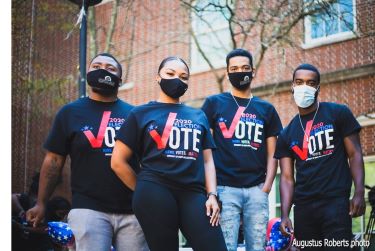
UMES students are focused on presidential election year
Thursday, October 8, 2020
Voting is always – or should be – a big deal; UMES students about to cast their first ballots in a national election are stoked about having a say in who will be president for the next four years.
That was evident on National Voter Registration Day in late September, when more than 350 UMES students turned out at the Student Services Center for a series of activities that reinforced lessons most were exposed to in high school civics classes.
Organizers of UMES’ event verified 287 participants already were registered and four dozen more registered to vote, joining an estimated 1.5 million others across the country, according to the non-partisan group that began staging the annual celebration in 2012.
That year, Barack Obama was re-elected president. Current UMES students were in elementary school when he made history four years earlier – in 2008.
“I think traditionally people think younger people don’t care about politics,” sophomore Amir Gawish said. “The whole mentality is starting to shift. We do care about politics … and we all have a responsibility to create a better tomorrow. Not necessarily for us, but for the generations after us.”
Freshman Jazmin Wilson of Laurel, Md. is excited not only about voting but heartened that her grandmother is committed to doing so as well. “She even joined a (get-out-the-vote) march to show her support,” Wilson said.
Wilson, a sociology major, comes from what she proudly calls a “multi-cultural family.” Her great-grandmother was biracial and “when it came time for her to vote … she had difficulty,” Wilson said. “Her race was holding her back, so she stopped voting altogether.”

Other members of Wilson’s family were discouraged by a pre-Civil Rights era culture that made it difficult or uncomfortable for people of color to vote.
Voting “is a rite of passage,” Wilson said. “Once you turn 18, you are considered an adult. I’m a first-generation college student. All the events in 2020, people being killed because of the color of their skin – where do I want to see my future?”
Sophomore Mackenzie Freeman registered back home in Cambridge, Md., where she went to high school, because “it’s important.”
“In order to have a say, you have to vote,” Freeman said. “You can’t complain about what’s going wrong if you not willing to at least make a change.”
Bryan Larose of Philadelphia also was registered to vote before returning for his sophomore year. “I wanted to take control of my future,” he said. “One way of doing that is to have a voice in who gets elected to office.”
“It’s especially important this year, because of our options,” Larose said. “(Donald) Trump and (Joe) Biden aren’t the best candidates. It’s about picking the lesser evil.”
Larose, a mechanical engineering major, said he’s read and heard that young people “take up more than half of the voting population, and we need to have our voices heard like older voters.”
Gawish, a computer science major from Burtonsville, Md., is looking forward to voting for the first time because he is the son of Sudanese immigrants who lived under a dictatorship.
“They were not able to vote,” Gawish said. “They protested (for that right) as college students. Now, I have the opportunity, and I should.”
Freeman finds motivation to vote in 2020 because “the government needs to be reformed. In the past four years, the current administration hasn’t done much to reform.”
“By reform, I mean social justice; equality, equity and the way we go about policing is a good example,” the criminal justice major said. “Many people think voting is not important. You don’t know until you get out there and see the difference you can make if you just vote.”

